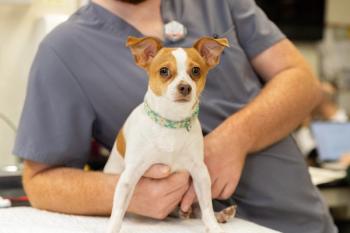
Study links traits to veterinarians' success
Cleveland- Aptitude tests and grade point averages alone won't likely determine the selection of future veterinary college applicants. Behavior characteristics, too, are critical for success in the profession, research shows.
Cleveland- Aptitude tests and grade point averages alone won't likely determine the selection of future veterinary college applicants. Behavior characteristics, too, are critical for success in the profession, research shows.
That's what 262 veterinarians across the country claimed in a study recentlycompiled by global consulting firm Personnel Decisions International (PDI).DVMs in private practice, industry and academia cite independence, the abilityto forge relationships and adaptability as key elements for success as aveterinarian, the research reveals.
It's the kind of information veterinary colleges lacked early last yearwhen a consortium of deans hired PDI to determine non-technical competenciesvital to professional success. PDI also will develop a behaviorally basedinterview guide for use during the student selection process, study authorBob Lewis says.
A long time coming
It's been more than 30 years since research has linked specific behaviortraits to success in the profession. So when the so-called Megastudy andBrakke management study results of 1999 and 2000, respectively, revealedthe profession as a whole lacks non-technical skills and business training,college officials recognized a need to better prepare students, Lewis says.
"Our study shows there is a core set of competencies that cut acrossall veterinary specialties," he says. "We originally investigatedwhether a different set of competencies applied to private versus academia.The fact is there really isn't."
Results under wraps
Despite the few hints Lewis shared regarding the study's results, theauthor refuses to release the research until Dr. Jeffrey Klausner, deanof the University of Minnesota College of Veterinary Medicine and head ofthe study's nine college sponsors, gives the go-ahead.
At presstime the Journal of the American Veterinary Medical Association(JAVMA) was reviewing the study for publication, and Klausner, in possessionof a final draft, refused to disclose it pending its JAVMA release.
How it worked
While little is known about the study's results prior to publication,Lewis did reveal how the data was gathered.
Last February, PDI started hosting focus groups from the upper Midwestto the Washington D.C. with veterinarians deemed successful by their peers.The open-ended sessions involved five to 30 veterinarians at a time.
"They were designed to create the maximum amount of discussion,"Lewis says. "They ran two to three hours. We probed them for behavioralexamples in folks they've seen, whom they admire and their definitions ofsuccess.
"To most of them, building relationships turned out to be the mostcritical element in achieving success."
Newsletter
From exam room tips to practice management insights, get trusted veterinary news delivered straight to your inbox—subscribe to dvm360.





